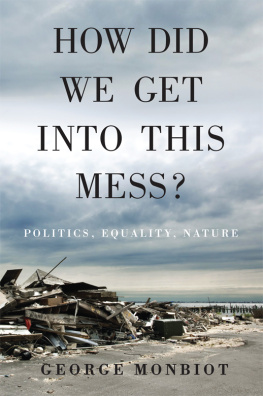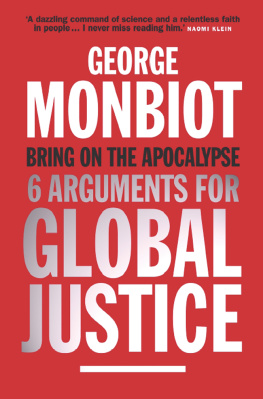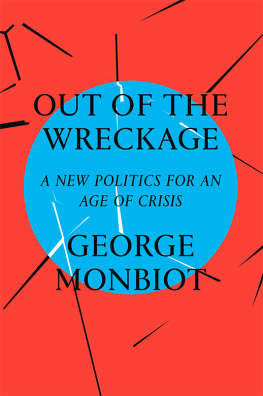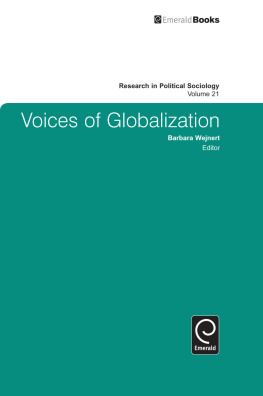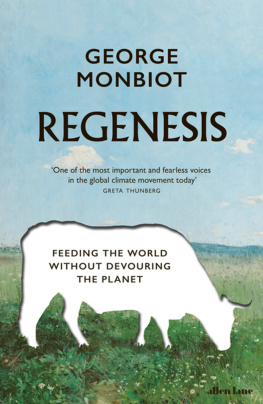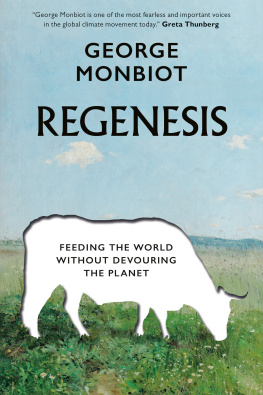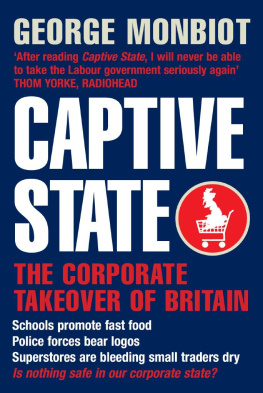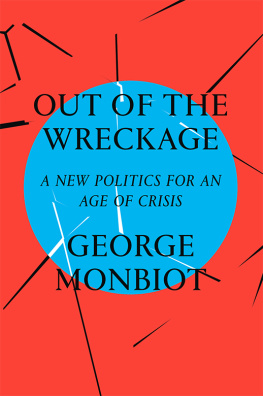How Did We Get
Into This Mess?
Politics, Equality, Nature
George Monbiot

First published by Verso 2016
George Monbiot 2016
Many of the articles reprinted here appeared first in the Guardian
All rights reserved
The moral rights of the author have been asserted
1 3 5 7 9 10 8 6 4 2
Verso
UK: 6 Meard Street, London W1F 0EG
US: 20 Jay Street, Suite 1010, Brooklyn, NY 11201
versobooks.com
Verso is the imprint of New Left Books
ISBN-13: 978-1-78478-362-4
eISBN-13: 978-1-78478-361-7 (US)
eISBN-13: 978-1-78478-363-1 (UK)
British Library Cataloguing in Publication Data
A catalogue record for this book is available from the British Library
Library of Congress Cataloging-in-Publication Data
Names: Monbiot, George, 1963 author.
Title: How did we get into this mess? : politics, equality, nature / George Monbiot.
Description: London ; Brooklyn, NY : Verso, 2016.
Identifiers: LCCN 2015050747 | ISBN 9781784783624 (hardback) | ISBN 9781784783617 (E-ISBN : US)
Subjects: LCSH: Social history 21st century. | World politics 21st century. | Economic history 21st century. | Corporations Political activity. | Business and politics. | Environmental degradation. | Globalization. | BISAC: POLITICAL SCIENCE / Political Freedom & Security / Civil Rights. | SCIENCE / Environmental Science. | NATURE / Ecosystems & Habitats / General.
Classification: LCC HN18.3 .M66 2016 | DDC 301.09/051 dc23
LC record available at http://lccn.loc.gov/2015050747
Typeset in Fournier MT by Hewer Text Ltd, Edinburgh
Printed in the US by Maple Press
To Rebecca, Hanna and Martha
Contents
In Capital in the Twenty-First Century, Thomas Piketty argues that no government programme could be sustained without an apparatus of justification. Without the corporate press, without spin doctors and lobbyists and think tanks, the unnecessary programmes of austerity that several governments have imposed would be politically impossible. Current levels of inequality would be considered intolerable. The destruction of the living world would be the occasion of constant protest. This apparatus of justification, or infrastructure of persuasion, and the justifying narratives it generates allow the rich to seize much of our common wealth, to trample the rights of workers and to treat the planet as their dustbin. Ideas, not armies or even banks, run the world. Ideas determine whether human creativity works for society or against it.
Ever since Andrew Carnegie, John D. Rockefeller and Thomas Edison financed the publication of Herbert Spencers works in the late nineteenth century,scala natura established by natural selection, with which we would be foolish to interfere, and that profound economic inequalities are both natural and necessary, global oligarchs have invested heavily in the infrastructure of persuasion. The newspapers they own and the think tanks they fund seek the best minds money can buy to produce brilliant and persuasive arguments in defence of the elite.
For every independent voice with a national platform, there are one hundred working on behalf of plutocratic power. Of course, this role is not specified in their contracts. I doubt that many people ask themselves before writing a column or a position paper, How can I best serve the interests of my billionaire proprietor today? But it does not take long to discover which positions and arguments secure your advancement, and which compromise it. In the media, proprietors appoint editors in their own image; editors tend to hire and promote the journalists whose views they find congenial.
The oligarchs spread their money wide. Some, for example, fund a large number of think tanks, creating the impression that their demands express a pre-existing consensus; that hundreds of thinkers have come to the same view independently. They use their power to browbeat and marginalise the few outlets they do not control: witness the global assault on public service broadcasting.
So few are the countervailing voices, and so thoroughly have they been excluded from most of the media, including the public broadcasters (now locked in a permanent state of terror and anticipatory compliance as they await the next assaults on their budgets), that the dominant forms of power remain almost unchallenged.
Take, for example, the ideology that now governs our lives. Not only is it seldom challenged; it is seldom even identified. As a result, no one seems to know what to call it. Neoliberalism? Market fundamentalism? Laissez-faire economics? Though it is a clear and consistent belief system, though it is the ideology to which most governments and major opposition parties subscribe, and though it determines everything from the distribution of wealth to the treatment of the living planet, it has no standard or widely recognised name.
Everyone knows, or thinks they know, what communism and anarchism mean, though both are now endangered species. But mention the dominant ideology in conversation whatever you choose to call it and most people will look at you blankly. Even if they have previously heard the term you use, they are unlikely to be able to define it. What greater power can there be than to operate namelessly?
So pervasive has neoliberalism become that we seldom even recognise it as an ideology. We appear to accept the neoliberal proposition that this utopian, millenarian faith (which holds that the free market, unimpeded by government intervention, will answer all human needs) is nothing more than a description of a neutral, natural force a kind of biological law, like Darwins theory of evolution.
In reality, the free market is a political construction, that often has to be imposed through violence, such as Suhartos massacres in Indonesia, Pinochets coup in Chile and the suppression of protests against structural adjustment and austerity all over the world.treatment: contracts, handouts, tax breaks, treaties, the crushing of resistance and other political favours. They extend their power beyond their trading relationships through their ownership of the media and their funding and control of political parties.
Freedom of the kind championed by neoliberals means freedom from competing interests. It means freedom from the demands of social justice, from environmental constraints, from collective bargaining and from the taxation that funds public services. It means, in sum, freedom from democracy. The negative freedom enjoyed by corporations and billionaires (freedom to be or to act without interference from others; as defined by Isaiah Berlin in his essay Two Concepts of Liberty) intrudes upon the negative freedom the rest of us enjoy. As a result, the great flowering of freedom that has enhanced so many lives since the end of the Second World War is now at risk.
The freedom of the elite from democratic restraint limits other peoples freedom from hunger, poverty and brutal conditions of employment. It limits free access to health and education; freedom from industrial injuries; freedom from pollution, addiction, loan sharks and confidence tricksters. Freedom for the financial sector means speculative chaos, economic crises and bailouts for which the rest of us must pay.
The crushing of protest and the promotion of corporate power (by instruments such as the proposed Transatlantic Trade and Investment Partnership) are just two forms of the extreme government intervention required to create a system which claims to be free from government intervention. Another example is the vast infrastructure of law and coercion needed to Another is the invention of limited liability, which permits companies to shed and socialise their losses. Neoliberalism, far from revealing biological laws, describes a system that creates its own reality.

